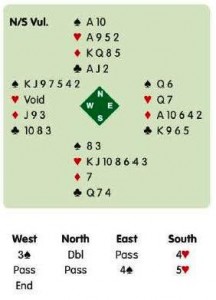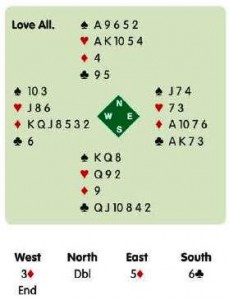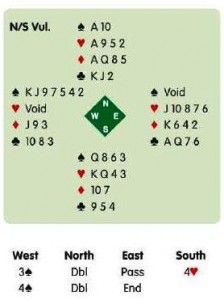Source: Mr. Bridge
Playing rubber bridge (or indeed any form of scoring), an opening bid of three or more indicates a hand with a long suit that is too weak to open at the one level. A three-level opening tends to show a seven-card suit. With eight cards, a bid at the four level is normal. Vulnerability is also a factor. You don’t want to lose 500 facing a bust. A player who pre-empts should not bid again unless his partner asks him to do so. Beware of this type of deal:
Position at the table is important and, for that reason, I do not agree with a pre-emptive bid of 3![]() on such barren values. Except at this vulnerability or in
on such barren values. Except at this vulnerability or in
third position after two passes. The rebid of 4![]() is stupid and insulting to partner.
is stupid and insulting to partner.
Surely he will know what to do. A preemptive bid indicates a lack of defensive
values.
Surprisingly, after the probable lead of the ace of hearts, declarer may escape
for two down. The initial lead is ruffed and then there are three further entries
to dummy for ruffing hearts. With the ![]() K-J-9 remaining, West should concede
K-J-9 remaining, West should concede
merely 300.
The downside, however, is that by not passing throughout, or by refraining from rebidding, West has robbed East of a lucrative penalty double of 4![]() that would fail by several tricks. The responder to a pre-emptive bid is, of course, not barred from raising. He has to visualise the hand opposite, which might have no defensive tricks.
that would fail by several tricks. The responder to a pre-emptive bid is, of course, not barred from raising. He has to visualise the hand opposite, which might have no defensive tricks.
Retaining the West hand from the previous example, but varying North’s
slightly, let me redistribute the South and East cards as follows: On the first round, East does not bid over North’s double. On the second round, at favourable vulnerability, he bids 4
On the first round, East does not bid over North’s double. On the second round, at favourable vulnerability, he bids 4![]() correctly as a sacrifice. Then South takes a view with his seven-card suit and bids 5
correctly as a sacrifice. Then South takes a view with his seven-card suit and bids 5![]() ending the auction. Clearly, West has no other choice but to lead a spade. Now South has no chance of eleven tricks because the spade loser cannot be discarded in time on a winning diamond. North would probably have doubled 4
ending the auction. Clearly, West has no other choice but to lead a spade. Now South has no chance of eleven tricks because the spade loser cannot be discarded in time on a winning diamond. North would probably have doubled 4![]() , if given the chance, but it might have
, if given the chance, but it might have
cost only 100 – far better than conceding 620 for the adverse game. Double dummy, the king of diamonds lead would achieve 300 against 4![]() doubled. We finish with a deal supplied by a friend from a match:
doubled. We finish with a deal supplied by a friend from a match:
My friend opened with a routine 3![]() , North, not wanting to choose a suit himself, doubled. East, realising that North would have the majors, added to the pre-empt by jumping to 5
, North, not wanting to choose a suit himself, doubled. East, realising that North would have the majors, added to the pre-empt by jumping to 5![]() . He reckoned that North-South would bid to 4
. He reckoned that North-South would bid to 4![]() or 4
or 4![]() and so made an advance sacrifice. South was in an unenviable position and chose unwisely – a slam was unlikely with his aceless hand. Some West players would, with no defence and their suit raised, bid 6
and so made an advance sacrifice. South was in an unenviable position and chose unwisely – a slam was unlikely with his aceless hand. Some West players would, with no defence and their suit raised, bid 6![]() over 6
over 6![]() . This is wrong. 6
. This is wrong. 6![]() could work only if North-South would make exactly 12 tricks in 6
could work only if North-South would make exactly 12 tricks in 6![]() . Likewise, East didn’t double 6
. Likewise, East didn’t double 6![]() . He feared one of 6
. He feared one of 6![]() or 6
or 6![]() might make if South held a void diamond and North a singleton club (swap the minor-suit nines to see what I mean). +100 yielded 11 IMPs when the other North-South made 4
might make if South held a void diamond and North a singleton club (swap the minor-suit nines to see what I mean). +100 yielded 11 IMPs when the other North-South made 4![]() . I said it before. I say it again, ‘Don’t
. I said it before. I say it again, ‘Don’t
bid again after pre-empting.’
Esta entrada también está disponible en: Spanish


